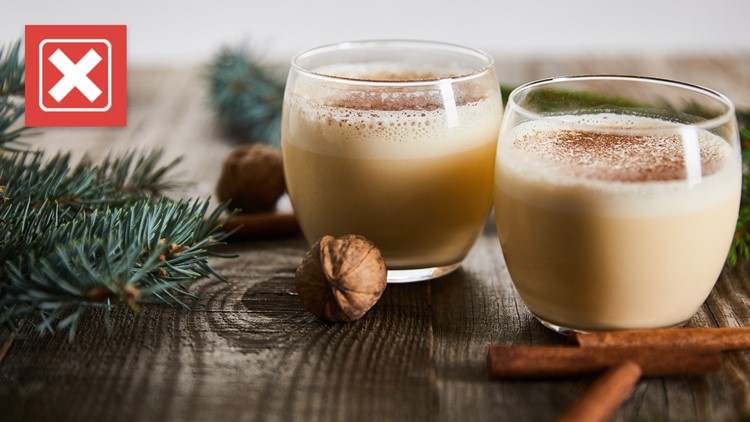Each year, eggnog becomes a mainstay of store shelves in the leadup to the winter holiday season, a testament to the drink’s popularity as a festive seasonal beverage. Many people also make their own homemade versions of the seasonal drink, using raw eggs.
Searches about eggnog’s safety have been trending on Google this winter. The worries come from the namesake raw egg, which is typically part of the drink and can pose a salmonella risk. Some people on social media have wondered if alcohol kills any salmonella bacteria in eggnog, making it safe to drink.
THE QUESTION
Does alcohol make eggnog with raw eggs safe to drink?
THE SOURCES
- U.S. federal code
- Melissa Prest, registered dietician, Academy of Nutrition and Dietetics
- A study published in the Journal of Food Science
- Ben Chapman, Ph.D., in a North Carolina State University article
- Centers for Disease Control and Prevention (CDC)
- University of Minnesota Extension
- University of Wyoming Extension
- Kansas State University Research and Extension
THE ANSWER
No, alcohol does not make eggnog with raw eggs safe to drink.
WHAT WE FOUND
Alcohol is not a reliable way to kill salmonella bacteria in raw eggs used in homemade eggnog recipes. The only reliable way to make eggnog safe is to use pasteurized eggs, or cook your eggnog. All store-bought eggnog contains pasteurized eggs and is safe to drink.
Typically, alcohol can kill bacteria if the concentration is between 60%-90%, like in hand sanitizer. But the concentration in eggnog is not that high. Typically, liquor with about 40% alcohol is mixed in with eggnog, so the resulting drink has lower alcohol content overall.
While alcohol in eggnog can make it harder for bacteria to grow, it cannot be relied upon to actually kill bacteria, the University of Minnesota Extension says.
A 2010 study that looked at components of wine – which typically has been 12-14% alcohol – to see if there were any antimicrobial effects, found that ethanol had negligible effect against foodborne pathogens, including salmonella. The study also noted “no reduction in pathogens was seen within the first 60 minutes after adding alcohol,” Ben Chapman, PhD, said in a North Carolina State University article.
Aged eggnog is another recipe where the ingredients, including alcohol, are mixed and left to sit for a longer period of time. But Chapman says one study that made this idea popular hasn’t been peer-reviewed, so “while it appears this specific recipe might work, we also don’t know what the threshold for alcohol content and egg/milk ratios would lead to similar Salmonella destruction.”
“Some people think that adding alcohol to the recipe will make the eggnog safe,” the University of Wyoming Extension says. “Alcohol will not kill the salmonella – only heat can kill it!”
Salmonella risk is verified to decrease not by liquor, but by heat. “It’s actually the cooking of the egg when you’re making the eggnog, that’s what’s going to really prevent that salmonella,” registered dietician Melissa Prest says.
U.S. federal code requires commercial eggnog to be pasteurized. Pasteurized eggs are eggs that have been heated to a high enough temperature for a long enough time to kill bacteria like salmonella, the Centers for Disease Control and Prevention (CDC) says.
Salmonella poisoning gives most people diarrhea, fever, vomiting and stomach cramps, the CDC says. Symptoms usually begin six hours to six days after infection and last four to seven days. In rare cases, salmonella poisoning can spread to the bloodstream and cause a life-threatening infection. Salmonella poisoning is more likely to cause serious illness in young children, older adults and people with weakened immune systems.
Refrigerated, unpasteurized eggs with clean, uncracked shells can still be contaminated with salmonella, the University of Minnesota Extension says. Eggs are less likely to be contaminated with salmonella than they used to be, but there are still some contaminated eggs, the CDC says.
“While only 1 in every 20,000 eggs contains salmonella, no one wants to spend their holiday in the hospital,” the University of Wyoming Extension says.
But since store-bought eggnog has already been pasteurized, it’s safe to drink with no additional preparation, the University of Minnesota Extension says.
Homemade eggnog, on the other hand, needs to be correctly prepared to be just as safe to drink.
There are two ways you can make homemade eggnog safe from salmonella contamination, the University of Wyoming Extension says. The first way is to use eggs or egg products that are already pasteurized by the time they’re sold at the store. Pasteurized eggs may cost a bit more than unpasteurized eggs, but the flavor and texture are generally the same. Liquid, frozen and dried egg products are required by law to be pasteurized, the University of Wyoming Extension says.
If you’d rather use unpasteurized eggs for your eggnog, then the University of Minnesota Extension suggests you use a recipe that has you cook the egg base for the seasonal drink to 160 degrees Fahrenheit.
“At this temperature, the egg mixture thickens enough to coat a spoon. Follow the recipe carefully. Refrigerate it at once,” the University of Minnesota Extension says. “When refrigerating a large amount of cooked eggnog, divide it into several shallow containers. Then it will cool quickly.”
Kansas State University describes the specific steps you should take when heating the egg base:
- Combine eggs and half the milk in your recipe. Sugar may also be added.
- Cook the mixture to 160 degrees Fahrenheit, stirring constantly. Use a double boiler to prevent scorching.
- After cooking, pour the mixture into a bowl and place in the refrigerator to chill.
- Add remaining ingredients and enjoy.
Commercial eggnog can be stored in the refrigerator for 3-5 days and frozen for up to six months, Kansas State University Research and Extension explains. Homemade eggnog can be refrigerated for 2-4 days. Freezing homemade eggnog is not recommended.
When cooked properly, the holiday treat can also have health benefits. Drinking eggnog can help you get about 10 grams of protein, high amounts of potassium and other nutrients and vitamins, Prest says.



